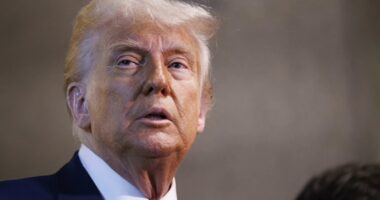Target is facing a 40-day consumer boycott starting Wednesday over the company’s shift away from diversity, equity and inclusion (DEI) policies.
“We’re asking individuals to withdraw their support from Target as they have disregarded our community’s needs,” stated Rev. Jamal Bryant, a well-known megachurch pastor in the Atlanta area who initiated the boycott, during a CNN interview.
The boycott, set to commence at the beginning of Lent, is a response to recent adjustments made by Target to its Diversity, Equity, and Inclusion (DEI) programs. The timing coincides with a challenging period for the company as it grapples with numerous challenges, including tariff issues amid a tough economic climate.
On January 24, shortly after Donald Trump assumed office, Target declared the removal of hiring targets for minority individuals, disbanding an executive committee dedicated to advancing racial equality, and implementing other modifications to its diversity efforts. The company unveiled a new initiative named “Belonging at the Bullseye,” initially introduced the previous year, to foster a sense of belonging among its workforce, customers, and communities. Target emphasized the importance of adapting to the changing external environment.
Target is one of dozens of Fortune 500 companies that have backtracked on DEI in response to conservative court decisions, pressure from activists and right-wing legal groups, and, more recently, the Trump administration’s threats to investigate what it characterizes as “illegal DEI,” including potential criminal cases against companies. Companies are caught between pursuing efforts to increase diversity and avoiding a conservative legal crackdown.
But no company has faced as fierce a blowback from DEI supporters as Target. Customers online have protested the decision and Anne and Lucy Dayton, the daughters of one of Target’s co-founders, called the company’s actions “a betrayal.”
Target is under more pressure than companies like Walmart, John Deere or Tractor Supply, because Target went further in its DEI efforts, and it has a more progressive base of customers than those competitors.
Target was a leading advocate for DEI programs in the business world in the years after George Floyd was murdered by police in the company’s home city of Minneapolis in 2020. Target also spent years building a public reputation as a progressive employer on LGBTQ issues.
“Black people spend upwards of $12 million dollars a day, and so we would expect some loyalty, some decency and some camaraderie,” Bryant said.
Melissa Butler, the CEO of the Lip Bar, one of the largest Black-owned makeup companies carried in Target, said on TikTok that she was disappointed about Target’s DEI pullback. But she worries that the boycott could hurt Black-owned businesses.
“We don’t want these minority businesses to suffer or to be impacted negatively,” she said.
Target declined to comment to CNN about the boycott. A spokesperson for Target said the company is still committed to inclusivity and offers a wide range of products and services, including items that are owned by Black and minority vendors.
But there are already signs that the blowback from Target’s move is impacting the company.
Customer visits to Target, Walmart and Costco have slowed over the last four weeks, but they have dropped the most at Target, according to Placer.ai., which uses phone location data to track visits. The slowdown could also be attributed to weather, economic conditions and other variables, Placer.ai cautioned.
The data “shows a clear drop in traffic in late January into mid-February following the company’s step back from DEI,” Joseph Feldman, an analyst at Telsey Advisory Group, said in a note to clients last week.
The boycott also comes as Target faces pressure from tariffs and a consumer pullback. Target said Tuesday its sales declined in February and it expects sales to only grow around 1% this year.
Target CEO Brian Cornell said in an interview with CNBC Tuesday that Trump’s tariffs on Mexico may force the company to raise prices on fruits and vegetables as soon as this week. Target also said that “tariff uncertainty” will impact its profit this quarter.
Cornell said Target relies heavily on Mexican produce imports during the winter. “Those are categories where we’ll try to protect pricing, but the consumer will likely see price increases over the next couple of days,” he said.

















